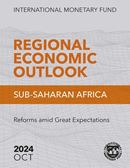This web page provides information on the activities of the IMF office in Equatorial Guinea, views of the IMF staff, and the relations between Equatorial Guinea and the IMF. Additional information can be found on the Equatorial Guinea and IMF country page, including official IMF reports and Executive Board documents.
At A Glance
- Equatorial Guinea joined the Fund in December 22, 1969
- Total Quotas (SDR): 157.5 million
- Outstanding Purchases and Loans (SDR): 76.54 million (as of September 30, 2023)
- Article IV/ Country Report: August 2022
Office Activities
-
Resident Representative Presentation in Malabo Youth Center (Presentation in Spanish)
The IMF Resident Representative Office in Equatorial Guinea gave a presentation to explain IMF’s mandate and role, as well as the activities implemented, and programs agreed with the Government since 2018. The event brought together more than 30 young people who showed interest in the work of the IMF. This event was organized with other UN agencies in the country to celebrate the United Nations Day.
October 26, 2023
-
The IMF Resident Representative Office in Equatorial Guinea presented to government’s officials on the role of the IMF in the country and its mandate. This presentation aimed at showing activities implemented by the IMF in Equatorial Guinea and the programs agreed with the Government since 2018, focusing on the 2019 EFF Program explaining its main specifications, main structural reforms, and fiscal adjustments; as well as the importance of the Resident Representative Office in the country. After the presentation, most of the questions focused on the EFF Program implementation status and outcomes. The seminar was organized by the Ministry of Foreign Affairs to disseminate the work and importance of multilateralism and international organizations to national; in addition, to explaining the work and mandate of each organization. All UN institutions were also invited.
June 13, 2023
-
REO Launch Presentation for Equatorial Guinea
Presentation in Spanish
November 11, 2019
GNQ and IMF
-
IMF Management Approves a Staff Monitored Program for Equatorial Guinea
July 24, 2024
Management of the International Monetary Fund has approved a 12-month Staff Monitored Program (SMP) for Equatorial Guinea that aims to deliver stronger, sustainable, and more inclusive private sector-led growth.
-
Republic of Equatorial Guinea: Staff-Monitored Program-Press Release; and Staff Report
July 24, 2024
Series:Country Report No. 2024/245
-
May 31, 2024
Series:Country Report No. 2024/144
-
April 17, 2024
Series:Country Report No. 2024/090
-
February 20, 2024
Series:Country Report No. 2024/052
Regional Economic Outlook
October 25, 2024
Sub-Saharan African countries are implementing difficult and much needed reforms to restore macroeconomic stability, and while overall imbalances have started to narrow, the picture is varied. Policymakers face three main hurdles. First, regional growth, at a projected 3.6 percent in 2024, is generally subdued and uneven, although it is expected to recover modestly next year to 4.2 percent. Second, financing conditions continue to be tight. Third, the complex interplay of poverty, scarce opportunities, and weak governance--compounded by a higher cost of living and short-term hardships linked to macroeconomic adjustment--are fueling social frustration. Within this environment, policymakers face a difficult balancing act in striving for macroeconomic stability while also working to address development needs and ensure that reforms are socially and politically acceptable. Protecting the most vulnerable from the costs of adjustment and realizing reforms that create sufficient jobs will be critical to mobilize public support.
Read the Report
Departmental Papers on Africa

Fraudulent Scam Emails
We would like to bring to the notice of the general public that several variants of financial scam letters purporting to be sanctioned by the International Monetary Fund (IMF) or authored by high ranking IMF officials are currently in circulation, and may appear on official letterhead containing the IMF logo. The scam letters instruct potential victims to contact the IMF for issuance of a “Certificate of International Capital Transfer” or other forms of approval, to enable them receives large sums of monies as beneficiaries. The contact e-mail information is always BOGUS and unsuspecting individuals are then requested to send their personal banking details which the scammers utilize for their fraudulent activities.For more information please see Fraudulent Scam Emails Using the Name of the IMF




